At Monday’s opening session of RadioDays Europe 2024 the General Manager of the conference Peter Niegel said alongside the programmed hot topics of AI and technology, podcasting, attracting youth to radio he had also responded to attendees feedback from 2023 which was more sales related sessions and also feedback for more feedback.
The evening previously I had met Roy Strømsnes from Norwegian strategic communication and marketing company Strømsnes Røe. He and business partner Knut Røe were facilitating several of the daily airchecking sessions in a designated Audio Room at the conference. They were all fully booked before the event started.
What Roy had identified in the Scandinavian broadcast industry was not just a lack of feedback to on air talent, but also a fear to speak honestly and the recurring chestnut of people receiving a “great show/bulletin/interview” with no additional details.
He and Knut run whole day and longer masterclasses where the entire working team come together to learn how to offer constructive feedback and then implement those standards into the regular workings of the company.
Within the Hippocratic Oath there is the phrase in Latin: Primum non nocere, or first do no harm. This is central to the values of Strømsnes Røe, Creating a work culture that is safe, and defending oneself is unnecessary.
I found it both positive and contrary to my own expectations that the radio industry is yearning for feedback and what they are receiving is superficial. I asked Roy if he would mind me sitting in on one of the sessions, they are closed door safe spaces for participants, and he kindly said yes.
There were three tables of five people plus a facilitator. The introductory question was how long people had worked in the industry and again, to my considerable surprise, more than 50% had two decades plus under their belts.
They were then asked how much feedback was given in their current environments, which in this instance was a high and positive figure, with Roy saying that is not usually the response and making the distinction between evaluation and feedback. Often, for example, the Monday Breakfast Show will have a post show evaluation but due to lack of time or set benchmarks by which the show is measured, individual feedback goes by the wayside.
Knut said, and I felt that many will relate to this, that when he started in radio in 1974 his boss said:
“You will never hear from me unless you make a mistake.”
The trepidation you then must feel any time you see your manager walk towards you!
The groups then were introduced to the concept of positive and alternative behaviour. You speak to what was great in the audio output and then the group could put forward alternative ways it could have been delivered. Roy said that in his masterclasses alternatives offered by a news reader for example to the breakfast DJ could offer a way they’d never thought of before.
The other concept that particularly resonated was that feedback be thematic, that is focused on one aspect at a time and not repeating the same criticism each time which builds a culture of defensiveness.
With all the techniques the groups went through, Roy and Knut said for a working culture to be changed then feedback needs to become frequent and part of editorial routine.
All the participants loved the session, and at just 40 minutes long, lingered as if they wanted more. I don’t think most knew each other and as a team building and bonding exercise it was wonderful to watch.
I have no doubt these sessions will return in 2025, with some of this year’s facilitated by the kind of industry voices you might dream of presenting your aircheck too. My feeling is that this sort of masterclass would do wonders for media organisations in Australia. Perhaps we too are yearning for feedback.
Jen Seyderhelm is a writer, editor and podcaster for Radioinfo.

